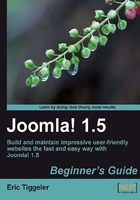
上QQ阅读APP看书,第一时间看更新
Time for action—hiding modules
Let's start with the modules. As much of the default ones are redundant for our goal, we'll switch them off. In Joomla! lingo, switching things off is called disabling. Disabling doesn't erase these modules; you can always enable them again.
- In the Extensions drop-down menu, click on Module Manager. The Module Manager displays a big list of modules that are installed: Breadcrumbs, Banners, Footer, and so on. In the Enabled column, you see whether or not the module is in use (and therefore visible in the frontend):

- Click on the green check mark to the right-hand side of the Banners module name. The check mark changes to a cross indicating that the module is now disabled.

- Now disable all of the following modules by clicking on the Enabled check mark next to the module name: Banners, Footer, Example Pages, Advertisement, Polls, Resources, Key Concepts, Login Form, Who's Online, Newsflash, Latest News, Popular, Top Menu, and Syndication. If you've followed along in Chapter 3, some of the menu modules may already be disabled. Make sure you don't inadvertently enable them again!
- To see the results click on Preview. Only a few modules are left, such as the main menu and the search box:

What just happened?
To be able to put together our first Joomla! site, we're getting rid of a lot of distracting extras so that we can build on a solid, simple foundation—a blank canvas perfectly suitable for the new Ugly Paintings site. That's why you have hidden a few extras that come with the example site. They're still ready for use, but you won't be needing them for now.
Step 2: Remove sample content
Let's remove the sample content now. It consists of three groups:
- Actual content: articles.
- The containers Joomla! uses to organize articles; these are called sections and categories. We'll learn more about them in the rest of this chapter.
- Menu links to these articles, sections, or categories.